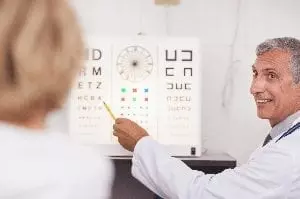When your eyes start to give you trouble, you know you should see an eye doctor as soon as possible to diagnose and fix the problem. However, you’ve likely heard different terms for eye experts: optician, optometrist, and ophthalmologist.
You may not know the difference between these three professions, but understanding what each of these experts do and how they can assist you with your eye health is crucial. In fact, each of these eye professionals performs different jobs and can only assist with certain aspects of your eye health.
Read below to learn more about opticians, optometrists, and ophthalmologists so you can determine who you should see for certain eye-related issues.
Opticians
While opticians are eye experts in their own rights, they don’t deal specifically with your eyes. Rather, they design, fit, and dispense prescription eyeglasses to patients. These professionals also analyze prescriptions and create lenses that perfectly fit those vision requirements. In an office, they work one-on-one with a patient to ensure that the patient’s chosen glasses rest appropriately on the nose and ears.
Additionally, opticians ensure that the overall fit of the glasses isn’t too loose or too tight. Since too-loose glasses can slide off your face and too-tight frames can pinch and cause headaches, you want to spend as much time as necessary with your optician to guarantee that your glasses rest where they should and feel comfortable as you wear them.
If you have any issues with your glasses after you leave your eye doctor’s office, an optician can help you repair or replace the lenses and frames. For example, if you notice your frames feel a little too tight or loose after you’ve worn them for a few months, your optician can readjust them so they fit properly again. Likewise, if you lose the screws in the hinges of the frame’s arms, an optician can make the necessary repairs.
Opticians also handle contact lenses and give them to patients who choose to wear these specific corrective lenses.
Opticians go through technical training or on-the-job programs to gain the skill and experience they need to perform their jobs properly.
Optometrists
Optometrists are the eye professionals you most often deal with when you have vision problems. These experts manage all aspects of primary eye care, including vision testing and diagnosing, treating, and managing vision problems like nearsightedness, farsightedness, and astigmatism. Optometrists also prescribe corrective lenses and medications necessary for correcting vision.
These experts undergo a traditional college education followed by four years of optometry school. Once their training is complete, they receive a doctor of optometry degree (OD) and can work with patients as their primary eye care provider. As they continue to work in this medical field, optometrists continue their education by attending classes or participating in seminars so they can maintain their certification.
If you’ve noticed any changes in your vision, require medication to treat an eye condition, or require vision aids, an optometrist is the eye professional you want to see.
Ophthalmologists
Of all the medical professionals who manage eye health, ophthalmologists have the highest level of education and can perform more extensive work on patients.
Ophthalmologists, after receiving a traditional undergraduate education, attend medical school, participate in a one-year internship, and complete at least a three-year residency program. After they complete this formal educational and hands-on training, they are then certified to work on more severe eye problems.
In addition to providing typical vision services like eye exams and diagnosing vision problems and conditions, ophthalmologists may also provide:
- Treatment for chemical burns, glaucoma, and iritis
- Surgery for cataracts, crossed eyes, or trauma
- Plastic surgery to correct conditions like droopy eyelids
Your optometrist may refer you to an ophthalmologist to properly and correctly diagnose eye conditions. If you are referred to an ophthalmologist for diagnosis or treatment, this specialist may require you to follow up with your optometrist to ensure that your eye health is in the best condition possible.
Additionally, an ophthalmologist can correct your vision permanently through corrective surgery. For example, if you don’t wish to use contacts or glasses to see clearly, you can make an appointment with an ophthalmologist to first determine if you’re a good candidate for a surgery like LASIK and then to undergo that surgery.
If you aren’t a good candidate for this kind of vision-correcting surgery, your ophthalmologist can advise you on the next best treatment so you can see clearly with minimal interruption to your daily life.
If you need to schedule an eye exam or get your current or new glasses fitted properly, schedule an appointment with All About Eyes. We ensure that your eye health is well cared for, and we’ll provide any professional advice and services that will allow you to see clearly and feel confident in your vision.
Have questions about which eye professional you need to see? Want to know more about how we can help you specifically? Don’t hesitate to get in touch with us.

